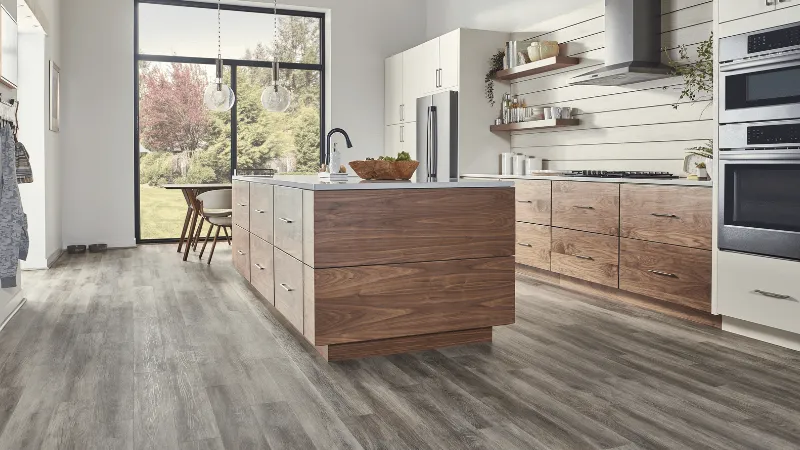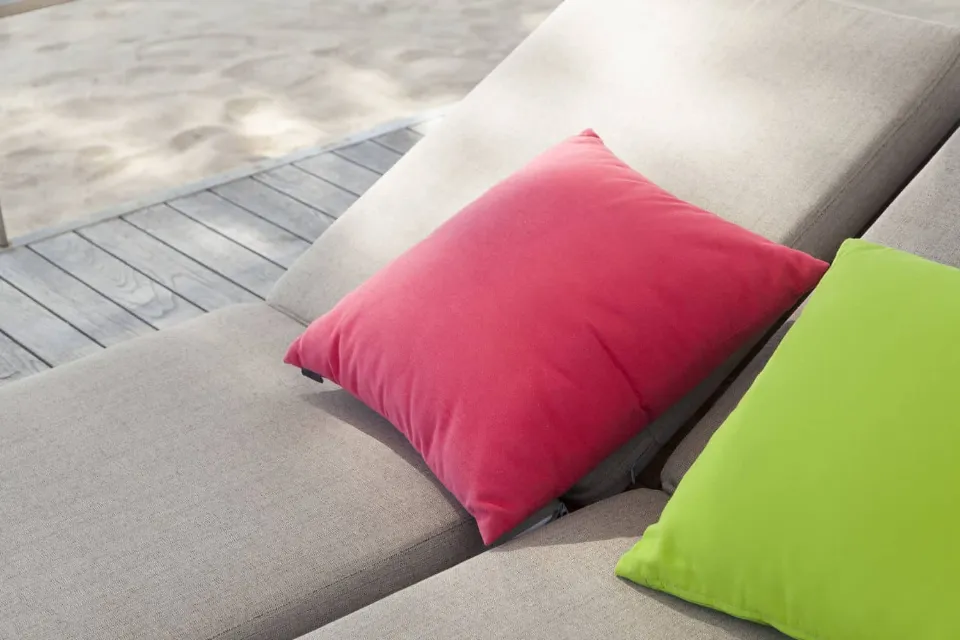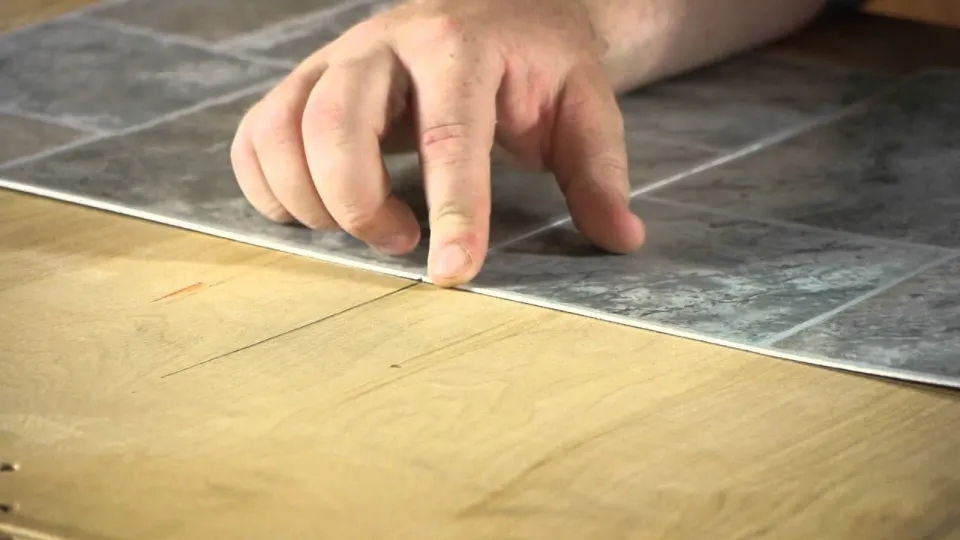To assist you in determining which option is best for you, we’ll go over some of the key distinctions between Hardwood Vs Vinyl Flooring in this blog post.
Vinyl flooring is primarily made of synthetic polyvinyl chloride fibers, unlike hardwood flooring, which is derived from real trees. Vinyl is a good option if you want a water-resistant flooring solution that is inexpensive, simple to install, and durable. But if you want a natural, elegant, high-end flooring solution, then hardwood is the best for you.
Keep reading.
What is Vinyl Flooring?
Vinyl flooring is a popular artificial flooring option. When creating it, one sandwiches a few layers of various materials, including Polyvinyl chloride (PVC). A natural hardwood pattern is then printed on the vinyl.
The two most common types of vinyl flooring are vinyl roll and Luxury Vinyl Tiles (LVT). Although they come with the same materials, the process of manufacturing them differs, explaining why they have varying effects.
Due to its affordability, vinyl flooring is now preferred by the majority of homeowners over other flooring types. Aside from that, it’s easy to maintain and moderately durable.
You should not confuse vinyl flooring with laminate flooring. These two are similar in layers, but they are made of various materials and have unique characteristics.
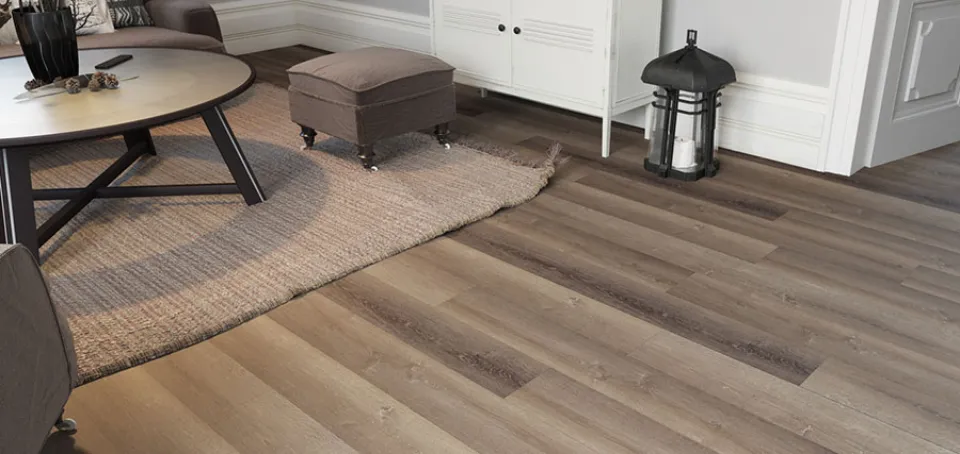
What is Hardwood Flooring?
Hardwood flooring is a lasting, natural type of floor surface covering option made with different wood species—these range from maple, oak, and cherry to mahogany, ash, and walnut. When making this flooring, wood need not be combined with other materials.
Homeowners all across the world have been using hardwood flooring for centuries. This might be attributed to its adaptability and undeniable visual appeal. Furthermore, it is useful for those looking for a more genuine flooring choice.
Hardwood flooring also raises the value of a house. Since you can expect to make a sizable profit from your upcoming home sale, this makes it your best option.
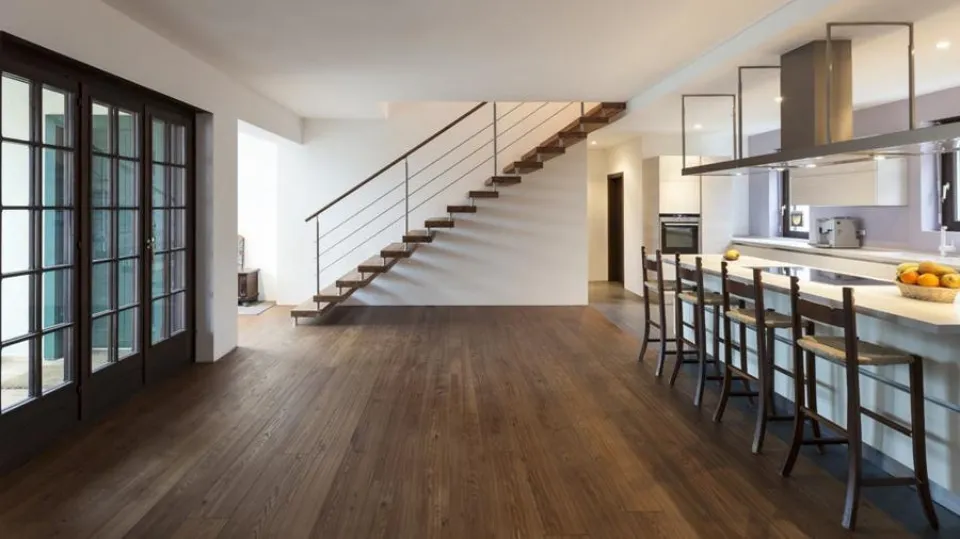
Vinyl Flooring Vs Hardwood
Are you looking for excellent flooring material for your home? Vinyl and hardwood should top your list of options. But you’re still required to pick one of them.
You might be able to make the best decision if you are aware of these ten differences between vinyl and hardwood flooring.
Material
Vinyl flooring makes use of different materials, including polyvinyl chloride (PVC). By contrast, hardwood flooring is made from real trees harvested from forests. One hardwood species may be used, or perhaps several.
For example, one could combine maple and oak to create hardwood flooring that will last.
Installation
Both hardwood and vinyl flooring can be installed by a proficient DIYer with access to the necessary tools and equipment. It’s simpler to install vinyl flooring. The best outcomes, however, are typically provided by a professional installation.
Hardwood flooring can be installed onto a level wooden subfloor 4 or a cement foundation. Because wood can flex over time, hardwood does not accommodate an uneven subfloor structure as well as vinyl does. The floor must have an expansion gap all the way around it so that the boards can expand and contract as a result of moisture.
While a perfectly level floor is not necessary for vinyl flooring, a perfectly clean surface is. On top of concrete, wood, or a layer of pre-existing flooring, vinyl can be installed. In addition to being glued to the floor surface, vinyl planks or tiles have a peel-and-stick backing. If remodeling is desired, this may make them challenging to remove.
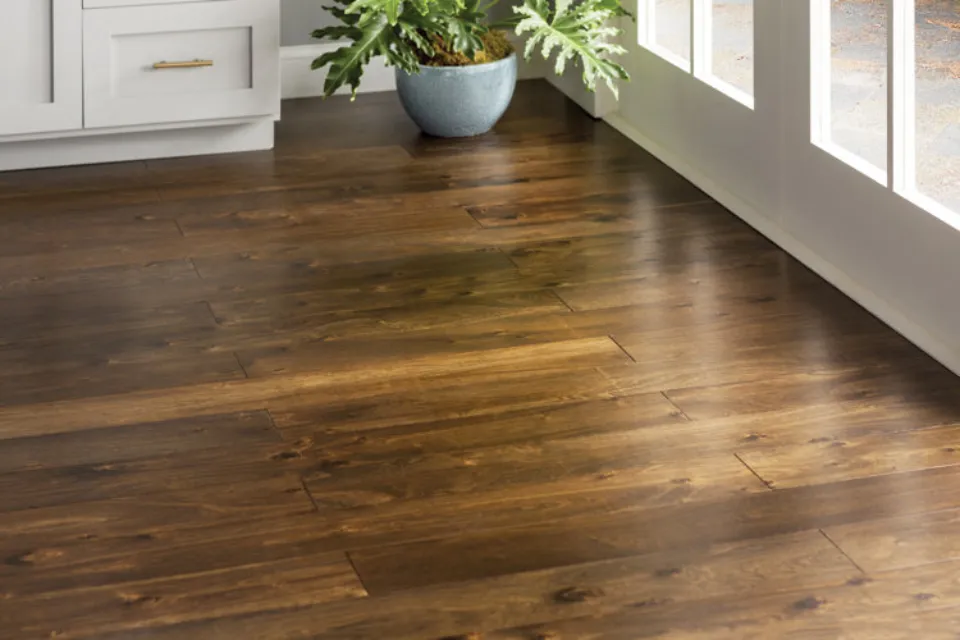
Costs
One of the most common reasons that people choose vinyl floors over hardwood floors is because they are much cheaper than hardwood floors while emulating the appearance of wood. Whereas high-quality wide plank flooring typically starts at $5 per square foot and can go for $20 per square foot or more depending on the options you select, you can find vinyl flooring for as little as $2 per square foot depending on the quality of material you are looking for.
The price of the flooring itself is just one thing to take into account when choosing wide plank flooring; installation costs should also be taken into account. Depending on your location and the type of flooring you select, installing hardwood floors will likely cost you an additional $6 per square foot at the very least.
When compared to hiring a professional to install real hardwood floors, installing vinyl floors will cost you much less in labor. This is so because installing vinyl floors is much easier than installing hardwood floors.
Appearance
Hardwood floors offer a more attractive appearance. They exhibit the natural tones and grains of the wood because they are made from solid wood. Depending on the trees used, the colors range from neutrals to reddish hues. Wood adds warmth to a room in design and reality since it is also a good insulator.
Modern vinyl planks are dyed and textured on the outer layer to mimic many different hardwood species, even the most expensive varieties. Once professionally installed, only a close examination will show the difference between vinyl and hardwood.
Vinyl has a softer, more sound absorbent quality than wood due to a layer of rubberized backing. Being loud is one disadvantage of natural wood.
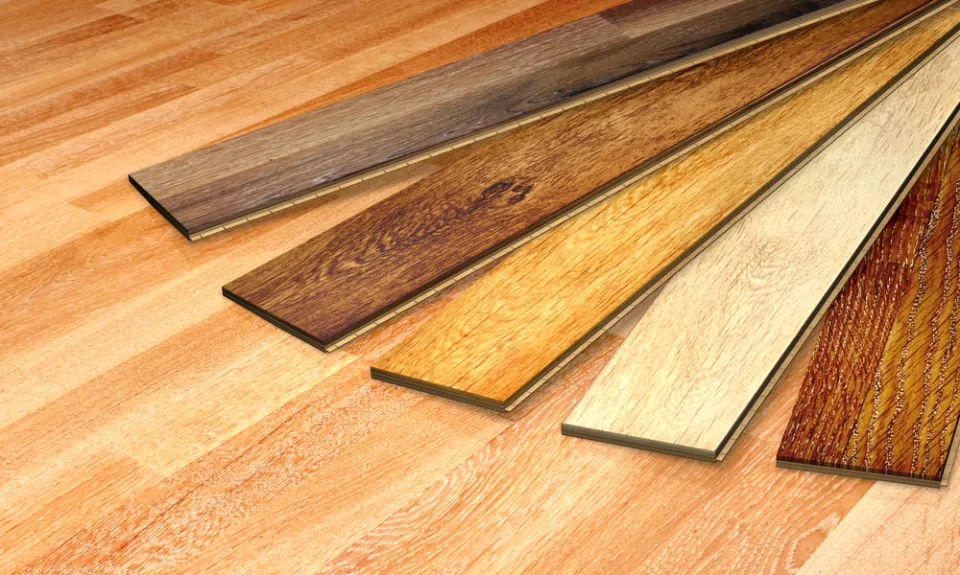
Maintenance
The fact that real hardwood floors need a lot of maintenance to maintain their aesthetic appeal is one disadvantage. Additionally, they require refinishing every few years. Just routine cleaning is enough to maintain vinyl floors.
Vinyl floors cannot be repaired if they are damaged; only replaced. Despite the fact that they require less maintenance than wood floors, vinyl floors cannot. This is significantly different from a wood floor, which can typically be refinished if only minor repairs are needed. More oil can easily be used to fix minor buffs and scratches in the finish if a penetrating finish is used.
Water Resistance
One of the significant perks of vinyl flooring is that it is 100% waterproof. You can wash this flooring as many times as possible without worrying about water damage. If your child accidentally spills drinks on it, mop the area and it will look brand new.
Hardwood flooring, however, is not waterproof. Your new hardwood floor can quickly become damaged by ongoing moisture exposure. It might be extremely expensive to replace or repair.
Call a specialist to replace or repair your hardwood flooring if it has been harmed by water. Unless you have experience, you may be unable to do it right. This could lead to more damage or harmful mold growth after a while.
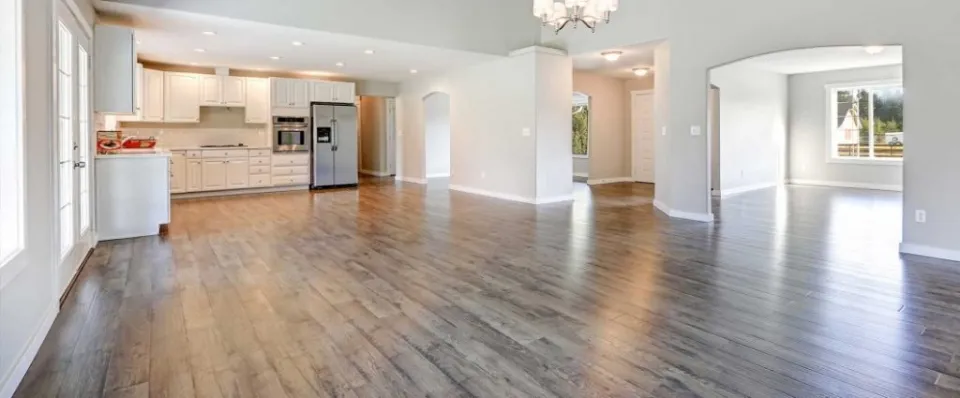
Repair
You can hire a professional to refinish and sand your hardwood flooring in order to fix any damage that has occurred. However, vinyl flooring doesn’t give you this option. The best you can do once it is damaged is to replace it in order to restore its original attractive appearance.
Environmental Impact
Since hardwood flooring is made from natural wood, it is a renewable resource. It has a lower environmental impact. Look for the Forest Stewardship Council’s certification to determine how the environmental impact of a particular wood variety will be affected.
Vinyl1 is not as environmentally friendly since it is made largely from PVC resin. Concerns exist about emissions of volatile organic compounds (VOCs) from PVC products including vinyl flooring. Floorscore® IAQ certification (Indoor Air Quality) was developed by the Resilient Floor Covering Institute and rates these VOC emissions.
When removed, hardwood floors can be recycled, but PVC-based vinyl flooring cannot.
Durability
Hardwood has an advantage when it comes to durability while vinyl takes first place in terms of price. A well-maintained hardwood floor can last for decades and, if it falls out of repair, hardwood can be refinished and made to look like new again.
Vinyl has a few advantages over hardwood, including being waterproof, which makes it simpler to clean up spills and other accidents, and being inexpensive, which makes it simple to replace broken or worn out pieces. Nevertheless, vinyl ages much more quickly than hardwood and might need to be replaced as frequently as every few years, depending on usage.
Home Reselling
A house’s value rises thanks to hardwood flooring. It’s more durable, and it comes with timeless beauty. Homebuyers are willing to pay a lot for it because they know the perks they’re set to enjoy.
With vinyl flooring, things are different. You might not get as much money when selling a house with vinyl floors. This is because this type of floor is less durable and easier to install. Additionally, it is less appealing when compared to hardwood flooring.
Suggested reading: Types of flooring you can put over ceramic tile includes ceramic tiles, laminate flooring, vinyl flooring, carpet, epoxy coating, cork flooring, wood flooring, and new fired tile. But, why choose these floorings? Below will give specific reasons.
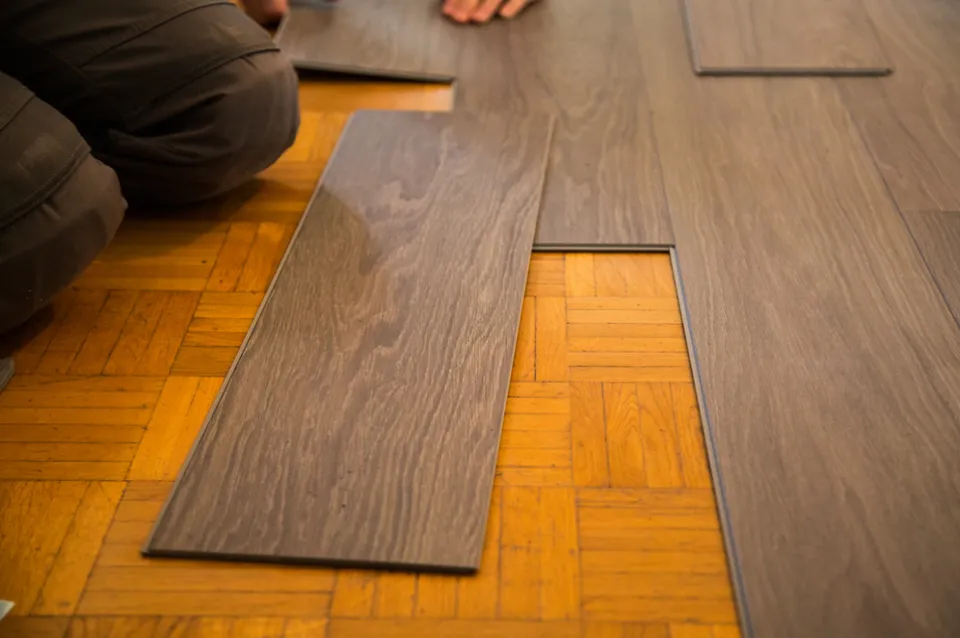
Vinyl Flooring Pros and Cons
Pros of Vinyl Flooring
- Cheap to purchase
- Effortless installation
- Easy to maintain
- Impervious to moisture
- Usable with radiant heat
Cons of Vinyl Flooring
- Less durable
- Tricky to repair
- Doesn’t affect property resale value
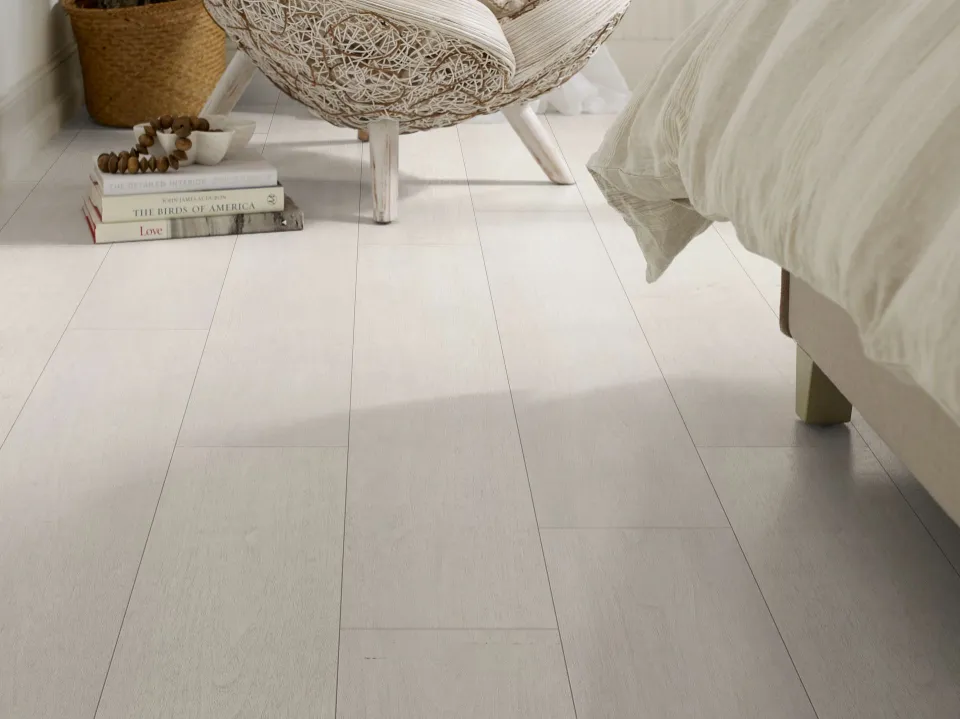
Hardwood Flooring Pros and Cons
Pros of Hardwood Flooring
- Extremely durable
- Looks stunning
- Increases a home’s resale value
- Easy to repair
- It’s a renewable resource
Cons of Hardwood Flooring
- Costly to buy and install
- Complicated to maintain
- Prone to moisture damage
- Susceptible to radiant heat damage
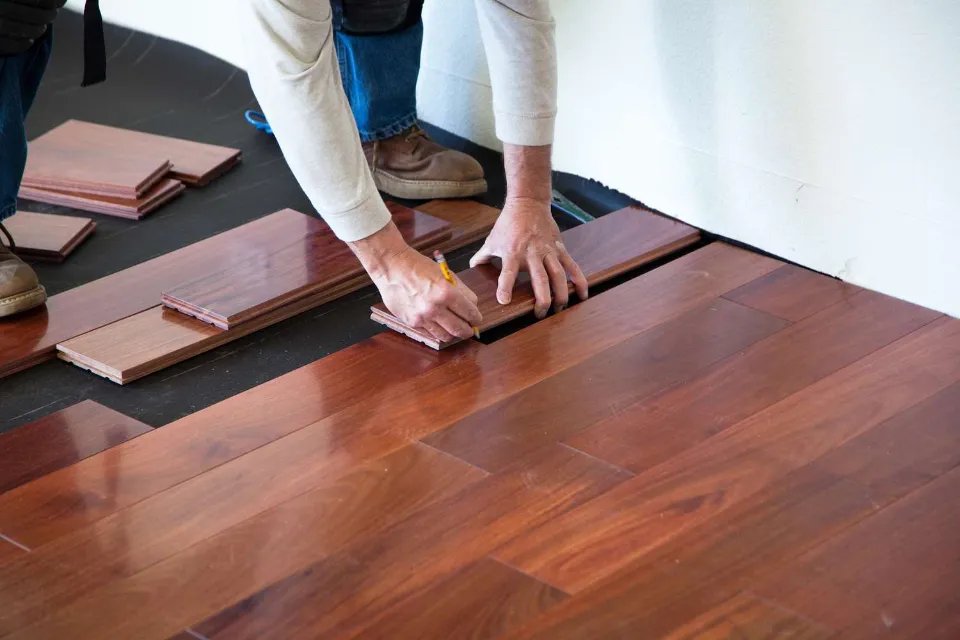
FAQs
Is Vinyl Plank Flooring More Expensive Than Hardwood?
The simple answer is: vinyl flooring is much cheaper than hardwood. When it comes to finishing a floor quickly and affordably, vinyl is a great option. However, as with everything else, cheaper costs have a cost of their own.
Is Vinyl Cheaper Than Hardwood?
Costs. Compared to real wood, luxury vinyl tile (LVT) and planks are significantly less expensive, with glue-down LVT being the most economical material. LVP costs range from $2 to $7 per square foot, including installation.
Which is Better Hardwood Or Laminate Or Vinyl?
Hardwood is more durable than laminate and vinyl in the long-term because of the strength of natural wood grains and special finishes that make it water- and fade-resistant. With the right care and maintenance, hardwood floors can last up to 100 years.
Does Vinyl Flooring Lower Home Value?
While luxury vinyl flooring has come a long way from its creation and has increased in durability and visual appeal, unfortunately vinyl may decrease your resale value in the long run. It’s crucial to understand that even though vinyl may be less expensive than other materials, hardwood, the ROI may be less.
Vinyl Vs. Hardwood Floors: Which One is Right for You?
The answer to this question largely depends on your needs and what you are looking for out of your flooring. Hardwood floors are an expensive initial investment that, in the long run, can significantly increase the value of your home.
Vinyl floors, on the other hand, might be the best option if all you need is some new, inexpensive flooring and you don’t want to make a big investment. Do your research to find a low-VOC type of vinyl flooring because you should be aware that some types of vinyl flooring may contain significant amounts of VOCs.
Even though hardwood floors are more expensive than vinyl floors, they offer timeless beauty, a potential boost to the value of your home in the event you decide to sell, and long-lasting flooring that can last for decades.
If you have any questions, please leave a comment. My Prime Home tries to give you the best home improvement information. Don’t forget to share the post. Thank you for reading.
Read about
